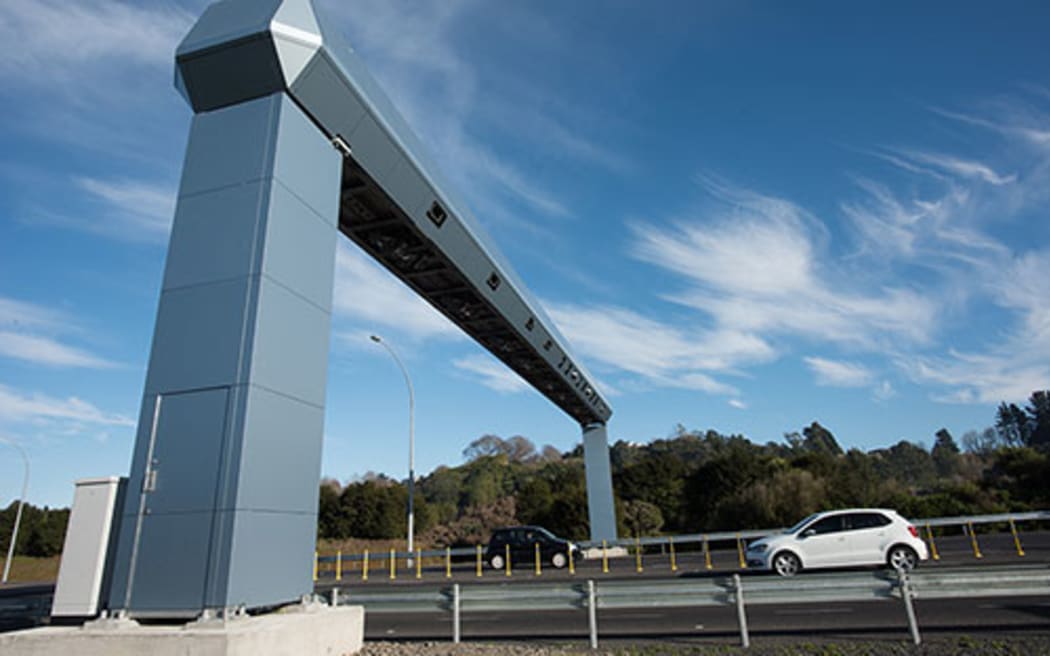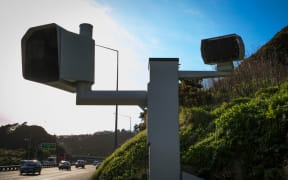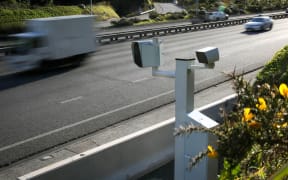
Photo: NZTA
Costs are rising and time is slipping on a new system to enable tolls to be charged on more roads.
Transport Agency documents show it had been due to begin within months but instead it will be 2024.
Technical support for the current system expired last Friday, after already being extended.
Only three highways are currently tolled and the rules make clear the public must be consulted before any others are.
However, Waka Kotahi has not provided an update to the public, despite RNZ requests to do so.
The documents show one argument for the government opting for the new $39m system - when another option explored was to do nothing - is because the new technology can enable more tolling.
"Opting to install a modern, fit-for-purpose back-office system may enable Waka Kotahi to more effectively manage demand on existing and future toll roads.
"It will allow preparation for wider pricing applications such as [blanked out]," a business case in February said.
A board paper in March said the new system was necessary to "provide functionality for upcoming toll roads as well as to support new capability that may be required, e.g. congestion charging".
Earlier this year, the job was not expected to take long, 13-14 months, with the system ready to go in June 2023.
But the winning bidder, Spanish transport tech giant SICE, announcing the deal itself just last month, said the project "will start its operations in 2024".
Delays of at least six months mean Waka Kotahi having to pay extra to keep the existing tolling backoffice system going.
The business case already expected additional cost if the project was not in place "until 2023".
It further warned "should the project not deliver by June 2023, this [a contingency fund] will be required to continue existing system support".
That contingency and other costs have been blanked out from the OIA documents by Waka Kotahi.
But the tender award in June shows the 10-year install-and-run deal is worth $39m to SICE.
NZTA considers all new highways for tolling - currently, it is looking at the Takitimu North Link project. If it recommended tolling that highway to the government, any public consult would be in 2023.
Source of revenue
Tolls are unusual in New Zealand, but in Sydney motorists pay $2 billion a year in road toll charges - a bill that has risen so high it triggered a recent state parliamentary inquiry into the impact on the cost of living.
The OIA documents show the government here wants to keep tolls up its sleeve as a way to raise money to pay to build roads, but that the existing system is "a very inefficient way of collecting money".
Under the new system, it will become much more automated and require far less manual checking.
The reports also show the toll system could be used for "other infringement processing", and the upgrade appears to involve retrofitting automated number plate recognition to at least some of the highway camera system.
Flexibility was key. "This solution provides the additional functionality required (this will have to be configured for each new service/toll road)," the report said.
Data costs
Data sovereignty is also pushing the cost up: The business case has factored in the higher cost of storing all the data from tolling onshore, instead of offshore which is much more common when it comes to masses of public New Zealand data.
The tolling upgrade is occurring alongside Waka Kotahi taking over speed cameras from police, adding 100 much smarter cameras in a first phase, then adding many more on risky roads out to 2030; and its new $1.38b contract for a national ticketing system.
These technological advances were stalled for years as the agency struggled to perform its regulatory and other functions for several years up till 2018-19 when the government launched several inquiries.
In Sydney, tolls have evolved in such a piecemeal way that studies have found that depending where you start, a 34km trip in to the Opera House can cost you either $A9 or $A24.
This has become a hot political issue, tricky when the NSW government relies on privatising tolled motorways to bankroll infrastructure projects.
The parliamentary inquiry concluded in August that the tolls were "unfair and inequitable. Meaningful and lasting reform is long overdue".
It suggested fee caps, altering toll corridors so trucks are not forced onto suburban streets as is happening more and more, and a review of the way. tolling giant Transurban is allowed to raise charges at four percent a year or the rate of inflation.




